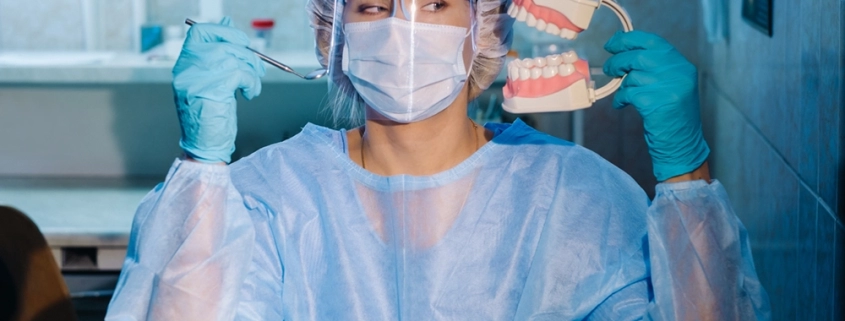Effects of COVID on Oral Health
According to the CDC, Populations disproportionately affected by Coronavirus Disease 2019 (COVID-19) are also at higher risk for oral diseases, and experience oral health and oral health care disparities at higher rates. The increase in stress and anxiety levels in response to the COVID-19 outbreak impacted health-promoting behaviors, including oral hygiene. There is worrying research regarding the link between gum disease and COVID-19. It has been indicated that those with gum disease are more likely to experience severe COVID-19. A study published in the Journal of Clinical Periodontology revealed that gum disease is a significant risk factor for coronavirus, which is worrying when you consider the fact that as many as half of the adults in America have this condition. Research found that patients with COVID-19 were nine times more likely to die if they had gum disease. Researchers found a close connection between the severity of dental disease, and the severity of COVID-19. About 75% of those with severe dental disease were hospitalized with COVID-19.
In this context, seeking regular dental care from experienced professionals becomes imperative for individuals to safeguard their oral well-being and potentially mitigate the risk of severe COVID-19 outcomes.
In Leeds, individuals can rely on the expertise and dedication of dentists in leeds to address their oral health needs effectively. With decades of collective experience, they stand as a trusted dental clinic in Leeds, committed to delivering personalized care tailored to individual needs. By prioritizing patient satisfaction and offering comprehensive dental services, including preventive care and treatment for gum disease, they play a crucial role in supporting the oral health and overall well-being of the community, especially during challenging times like the COVID-19 pandemic.
The oral cavity is a potential reservoir for respiratory pathogens. Previous trials have linked poor oral hygiene with increased inflammation and cardiovascular disease. According to researchers, COVID-19 severity has also been linked to an inflammatory response.
There was a widespread decline in children’s oral health status and access to oral health care during the COVID-19 pandemic. SARS-CoV-2, the virus that causes COVID-19, gets into your bloodstream via a receptor called ACE2. This receptor is like the front door that allows the virus into the cells. Where there are lots of cells with ACE2 receptors? Your mouth, tongue, and gums! People who have poor oral health also tend to have more ACE2 receptors, further linking the connection between COVID-19 and oral health.
Although COVID-19 is predominantly a respiratory disease, many people have reported symptoms that go beyond the respiratory system, including those affecting the mouth. The delay of preventive oral health care, and the stress caused by COVID19, resulted in a higher incidence of adverse oral conditions for many.
The Coronavirus Pandemic has caused many people to increase Teeth Grinding and Clenching. The COVID-19 pandemic caused a significant adverse effect on the emotional well-being of many. Loss of income, loss of loved ones, fear of Coronavirus, and illness all contributed to a condition called Bruxism or teeth grinding and clenching, in many people.
This condition can result in:
- Cracked teeth
- Loose teeth
- Temporal Mandibular Joint (TMJ) pain
- Headaches
- Wear on Teeth
- Increased Sensitivity to Hot and Cold
In order to prevent these possible side effects from grinding or clenching your teeth, consult with Dr. Galaif to determine if having a Mouth Guard made could be the best solution for you. Dr. Galaif and his staff may also recommend warm compresses and pain relievers.
In 2000, the first and only Surgeon General’s Report on Oral Health made clear that oral health is part of overall health and well-being. The mouth is indispensable to eating, speaking, smiling, and quality of life. The most prevalent oral conditions and periodontal diseases are largely preventable. Poor oral health is one of the most prevalent non-communicable diseases (NCD’s) worldwide, consuming one-fifth of out-of-pocket health expenses.
Oral health should be a priority for everyone. There are many, simple day-to-day habits that will help you maintain your Oral Health:
- Brush twice daily for two minutes with a fluoridated toothpaste.
- Properly floss and brush/clean your tongue once daily.
- Never share a toothbrush.
- Change your toothbrush every three months, or sooner if you are sick.
- Drink plenty of fluoridated water.
- Limit starchy, or sugary foods and drinks.
- Resist unhealthy habits to manage stress (smoking, consuming alcohol, biting fingernails).
If your gums bleed while brushing or flossing, continue to brush and floss gently and thoroughly. When gum health improves, bleeding often decreases.
If you are concerned about the effects of COVID-19 on your oral health, or for any other dental-related concerns, call us to make an appointment at (818) 789-6789 or visit the appointment page on our Web site:




